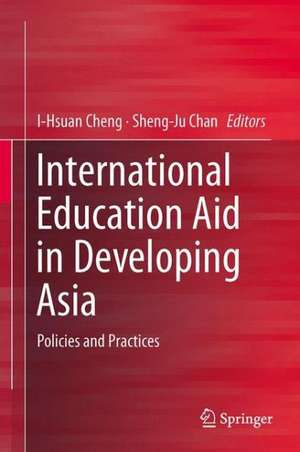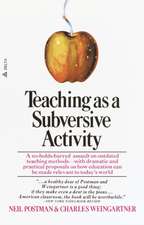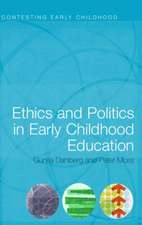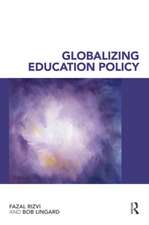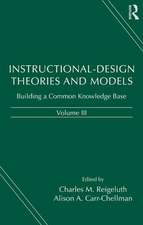International Education Aid in Developing Asia: Policies and Practices
Editat de I-Hsuan Cheng, Sheng-Ju Chanen Limba Engleză Hardback – 9 iun 2015
| Toate formatele și edițiile | Preț | Express |
|---|---|---|
| Paperback (1) | 386.39 lei 6-8 săpt. | |
| Springer Nature Singapore – 23 oct 2016 | 386.39 lei 6-8 săpt. | |
| Hardback (1) | 393.74 lei 6-8 săpt. | |
| Springer Nature Singapore – 9 iun 2015 | 393.74 lei 6-8 săpt. |
Preț: 393.74 lei
Nou
Puncte Express: 591
Preț estimativ în valută:
75.34€ • 78.67$ • 62.21£
75.34€ • 78.67$ • 62.21£
Carte tipărită la comandă
Livrare economică 16-30 aprilie
Preluare comenzi: 021 569.72.76
Specificații
ISBN-13: 9789812874559
ISBN-10: 9812874550
Pagini: 220
Ilustrații: X, 254 p. 13 illus., 12 illus. in color.
Dimensiuni: 155 x 235 x 20 mm
Greutate: 0.55 kg
Ediția:2015
Editura: Springer Nature Singapore
Colecția Springer
Locul publicării:Singapore, Singapore
ISBN-10: 9812874550
Pagini: 220
Ilustrații: X, 254 p. 13 illus., 12 illus. in color.
Dimensiuni: 155 x 235 x 20 mm
Greutate: 0.55 kg
Ediția:2015
Editura: Springer Nature Singapore
Colecția Springer
Locul publicării:Singapore, Singapore
Public țintă
ResearchCuprins
Chapter 1 Introduction: Asian Perspectives on International Education Aid: From Donor Experience, to Transitional Experience and Recipient Experience of International Education Aid.- Part I: Debates over International Education Aid Policies and Practices in Developing Asia.- Chapter 2 Trends and Challenges of Aid Effectiveness: The Rise of Asia.- Chapter 3 Promise Unfulfilled: Perspectives on Current Trends and Issues in Education and Skills in Asia.- Part II: Lessons Learnt from Asian Donors' Engagement in education MDGs and EFA.- Chapter 4 Japan's Educational Cooperation Policies and its Implications for a Post-2015 World.- Chapter 5 Japan's International Cooperation in Education - Pursuing Synergetic Results.- Chapter 6 Exploring Alternative Educational ODA Paradigm based on Global Challenges and South Korean Experience - Focusing on ALCoB and Smart Systemic Change Model.- Chapter 7 The Evolving Patterns and History of Taiwan's Official Educational Aid.- Part III: Lesson Learnt from Asian States' Transitions from Aid Recipients to Donors.- Chapter 8 China's International Aid in Education: Development, Determinants and Discord.- Chapter 9 Questing for Asian World City Status and Promotion of Global Citizenship: Hong Kong's Responses to Development and Aid Projects in the Region.- Chapter 10 Education Aid and International Cooperation in India: Shifting Dynamics, Increasing Collaboration.- Part IV: Lessons Learnt from Asian Recipient Countries' Reflections on education MDGs and EFA on the Ground.- Chapter 11 Donor Aid to the Education Sector in Sri Lanka and the achievement of education goals.- Chapter 12 Developing and Managing International Cooperation and Partnerships for Educational Development in Cambodia: Transforming Aid Effectiveness into Development Effectiveness.- Part V: What Next for Post-2015 International Education Aid Agenda?.- Chapter 13 Conclusion: International Education Development in the Post-2015 Era.
Textul de pe ultima copertă
This book provides an Asian perspective on the timely, urgent questions of how international education aid and development should move forward and what development roles Asia should play, especially following the end of the UN Millennium Development Goals (MDGs) and Education for All (EFA) in 2015. To answer these questions, four separate but interwoven parts, which analyze and anchor education MDGs and EFA policies and practices by means of diverse case studies of donor states, recipient states, and states with a dual and transitional role in Asia, are addressed. On the basis of the analyses, a clearer and concrete direction for effectively and sustainably extending international education aid and development beyond 2015 can be derived.
Caracteristici
First book to provide readers insights into how international education aid and development can move forward after MDGs and EFA end in 2015 Focuses on aid and development effectiveness beyond 2015 are explained and mapped from an Asian perspective Base its policy arguments on abundant evidence drawn from case studies of Asian countries, including donor states, states with a dual and transitional role and recipient states
